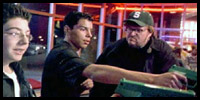
 |
Bowling for Columbine (2002) Directed by Michael Moore Cast: Michael Moore, Charlton Heston, Matt Stone, Marilyn Manson, James Nichols 2002 – 120 minutes Rated: Reviewed by Dustin Putman, October 27, 2002.  In years to come, "Bowling for Columbine" should stand as a watermark for how powerful and riveting a documentary film has the ability of being. For acclaimed documentarian Michael Moore (1989's "Roger & Me"), this is his greatest achievement, to date, as he takes a close-eyed, merciless look at the gun violence and fear that has swept over the United States. As usual, Moore has his own ideas and opinions, but does not choose sides as much as he records both viewpoints.
In years to come, "Bowling for Columbine" should stand as a watermark for how powerful and riveting a documentary film has the ability of being. For acclaimed documentarian Michael Moore (1989's "Roger & Me"), this is his greatest achievement, to date, as he takes a close-eyed, merciless look at the gun violence and fear that has swept over the United States. As usual, Moore has his own ideas and opinions, but does not choose sides as much as he records both viewpoints.
 What is certain is the major reason for why Moore decided the subject was one worth delving into. At 6:00 a.m. on April 20, 1999, two high school outcasts, Dylan Klebold and Eric Harris, went bowling in their peaceful hometown of Littleton, Colorado. Only hours later, they entered into Columbine High School and opened fire on their classmates and teachers, creating a deadly bloodbath that ended with their own suicides. This tragic event shook the nation, and everyone started pointing figures and putting the blame on everything from the two teens' parents, to the continuous taunting of their peers, to their easy access to firearms, to violent movies, music, and video games. The simple fact is no one knows why Klebold and Harris did what they did, nor are we ever going to know for sure.
What is certain is the major reason for why Moore decided the subject was one worth delving into. At 6:00 a.m. on April 20, 1999, two high school outcasts, Dylan Klebold and Eric Harris, went bowling in their peaceful hometown of Littleton, Colorado. Only hours later, they entered into Columbine High School and opened fire on their classmates and teachers, creating a deadly bloodbath that ended with their own suicides. This tragic event shook the nation, and everyone started pointing figures and putting the blame on everything from the two teens' parents, to the continuous taunting of their peers, to their easy access to firearms, to violent movies, music, and video games. The simple fact is no one knows why Klebold and Harris did what they did, nor are we ever going to know for sure.
 The same thing could be said, Michael Moore concludes, about why the United States has the highest murder rate of any country, despite just as easy access to guns in others parts of the world. In one year alone in the U.S., there are over 11,000 acts of gun violence, while in Canada, there are less than 170. Taking a trip up to Canada, separated from the U.S. only by a border, Moore interviews citizens and finds that, despite just as many guns, the majority keep their doors unlocked at night and are not driven by the kind of fear and desperation America is burdened with.
The same thing could be said, Michael Moore concludes, about why the United States has the highest murder rate of any country, despite just as easy access to guns in others parts of the world. In one year alone in the U.S., there are over 11,000 acts of gun violence, while in Canada, there are less than 170. Taking a trip up to Canada, separated from the U.S. only by a border, Moore interviews citizens and finds that, despite just as many guns, the majority keep their doors unlocked at night and are not driven by the kind of fear and desperation America is burdened with.
 Moore also interviews a handful of celebrities, and their comments are startlingly truthful and well-spoken. Matt Stone, co-creator of "South Park," grew up in the town of Littleton, Colorado, and describes it as a mundane, monotonously normal place to live. He says that from an early age, kids are brainwashed by peers and elders into believing that if they are not model students, they will never amount to anything. He hypothesizes a valid possibility that Klebold and Harris were forced into believing that they would always be nobodies, and finally just gave up.
Moore also interviews a handful of celebrities, and their comments are startlingly truthful and well-spoken. Matt Stone, co-creator of "South Park," grew up in the town of Littleton, Colorado, and describes it as a mundane, monotonously normal place to live. He says that from an early age, kids are brainwashed by peers and elders into believing that if they are not model students, they will never amount to anything. He hypothesizes a valid possibility that Klebold and Harris were forced into believing that they would always be nobodies, and finally just gave up.
Likewise, shock rocker Marilyn Manson, who was one of the big targets following the Columbine massacre, finds it ridiculous that he is instantly blamed for inspiring kids to be themselves while, on the day of the shootings, Bill Clinton instructed the bombing of a foreign country and was still viewed as an innocent. Manson's intelligent answer to dealing with children grappling with serious problems in their lives? Listen to them.  "Bowling for Columbine" is absolutely rapturous cinema, a virtuoso motion picture that is, at once, fascinating, informative, heartbreaking, disturbing, and bitingly hilarious. Moore takes a sharply observed satirical tone to much of the material, and the results are incendiary in the way people's naivety and lack of answers can hold so much humor. An animated interlude that very funnily and incisively takes a look at the violent history of our country is a showstopper.
"Bowling for Columbine" is absolutely rapturous cinema, a virtuoso motion picture that is, at once, fascinating, informative, heartbreaking, disturbing, and bitingly hilarious. Moore takes a sharply observed satirical tone to much of the material, and the results are incendiary in the way people's naivety and lack of answers can hold so much humor. An animated interlude that very funnily and incisively takes a look at the violent history of our country is a showstopper.
When it comes time to be serious, however, the film can elicit responsive tearshed. This is no more true than in the shocking security camera footage of the gun and bomb-carrying Klebold and Harris from within Columbine High School during the fateful rampage. Also deeply felt is the account of 6-year-old Kayla Rolland, who was shot and killed by a 6-year-old classmate in Flint, Michigan on February 29, 2000—the youngest school shooting on record. The young shooters source for acquiring the gun? His uncle's house, where he had been staying while his mother, a hardworking woman struggling to withhold a bogus work-for-welfare program, was being evicted from her home.  An unexpected turn-of-events comes when Moore teams up with two surviving victims of Columbine, both still carrying the bullets within their bodies and one permanently paralyzed, to trek to K-Mart headquarters, the company where the bullets were sold. After questioning why they would still carry ammunition in their stores when they have long-since stopped selling guns, they are speedily informed that the stores would discontinue their selling of ammunition after a standard 90-day phase out period. It is a small victory for Moore, who is dumbfounded by K-Mart's response.
An unexpected turn-of-events comes when Moore teams up with two surviving victims of Columbine, both still carrying the bullets within their bodies and one permanently paralyzed, to trek to K-Mart headquarters, the company where the bullets were sold. After questioning why they would still carry ammunition in their stores when they have long-since stopped selling guns, they are speedily informed that the stores would discontinue their selling of ammunition after a standard 90-day phase out period. It is a small victory for Moore, who is dumbfounded by K-Mart's response.
The film leads up to an agreed interview between Moore and NRA advocate Charlton Heston, who held controversial rallies in both Flint and Littleton just days after both town's shooting tragedies. The confrontation between the outspoken Moore, an NRA member himself, and Heston, an apparent walking contradiction, is predictably edgy and ends on an emotionally shattering note.  "Bowling for Columbine" is one of the year's biggest entertainments, and one of its most thought-provoking. The mystery involving the overly violent nature of America lives on, and what director Michael Moore discovers is that there isn't a concrete conclusion to be possibly drawn. Why is it that any U.S. citizens can personally own handguns just as easily as hunting rifles? Nobody, it seems, can find a valid reason for their purpose aside from as a gateway to further violence. "Bowling for Columbine" isn't just a highly recommended accomplishment; it deserves to be required viewing.
"Bowling for Columbine" is one of the year's biggest entertainments, and one of its most thought-provoking. The mystery involving the overly violent nature of America lives on, and what director Michael Moore discovers is that there isn't a concrete conclusion to be possibly drawn. Why is it that any U.S. citizens can personally own handguns just as easily as hunting rifles? Nobody, it seems, can find a valid reason for their purpose aside from as a gateway to further violence. "Bowling for Columbine" isn't just a highly recommended accomplishment; it deserves to be required viewing.
©2002 by Dustin Putman |
 |













